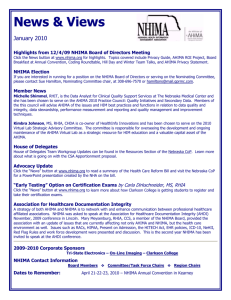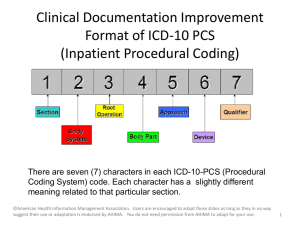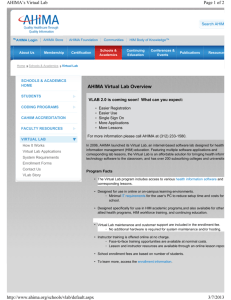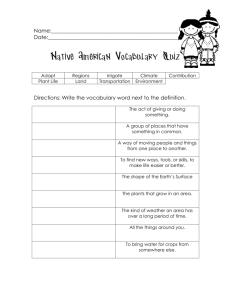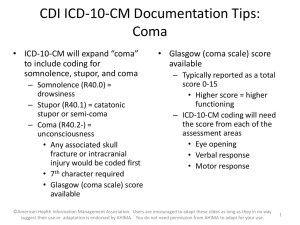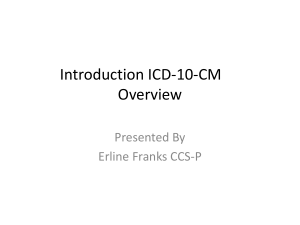ICD-10-CM/PCS 101 for CDI - Ahima
advertisement
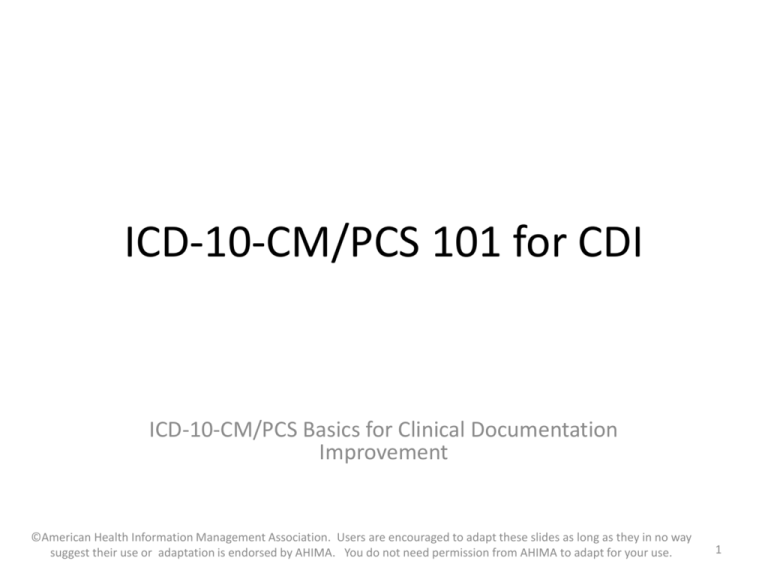
ICD-10-CM/PCS 101 for CDI ICD-10-CM/PCS Basics for Clinical Documentation Improvement ©American Health Information Management Association. Users are encouraged to adapt these slides as long as they in no way suggest their use or adaptation is endorsed by AHIMA. You do not need permission from AHIMA to adapt for your use. 1 Opening Statement & Instruction • This presentation is designed for professionals in the role of CDI to create an awareness and provide a high-level overview of the who, what, where, and why of ICD-10-CM/PCS. • Having an ICD-10 101 information tool and accompanying documents will help promote awareness during implementation as well as promote consistency with messaging. [This slide would be deleted from the actual presentation.] 2 ©American Health Information Management Association. Users are encouraged to adapt these slides as long as they in no way suggest their use or adaptation is endorsed by AHIMA. You do not need permission from AHIMA to adapt for your use. ICD-10 Introduction • The WHO (World Health Organization) owns and publishes ICD (International Classification of Diseases), which is used world-wide for morbidity and mortality reporting. – The 10th revision (ICD-10) was endorsed in 1990. – Many countries have been using ICD-10 or a modified version of it since 1994. – The U.S. has been using ICD-10 for mortality reporting since 1999, but continues to use a modified version of ICD-9 referred to as ICD-9CM for morbidity reporting and other purposes. 3 ©American Health Information Management Association. Users are encouraged to adapt these slides as long as they in no way suggest their use or adaptation is endorsed by AHIMA. You do not need permission from AHIMA to adapt for your use. ICD-10 Introduction • In January 2009, the federal government determined the U.S. would upgrade to the 10th revision of the ICD as of October 1, 2014. – ICD-10-CM (Clinical Modification) • Used to assign diagnosis codes • A clinical modification of ICD-10 developed by the National Center for Health Statistics (NCHS), a division of the Centers for Disease Control and Prevention (CDC) – ICD-10-PCS (Procedural Coding System) • Unique to the US and independent of ICD-10, but designed to complement the structure of ICD-10 • Developed by the Centers for Medicare and Medicaid Services (CMS) with 3M’s health information systems division • Used to assign procedure codes for the inpatient setting 4 ©American Health Information Management Association. Users are encouraged to adapt these slides as long as they in no way suggest their use or adaptation is endorsed by AHIMA. You do not need permission from AHIMA to adapt for your use. WHY: Benefits to ICD-10-CM/PCS • Reduced ambiguity • Enhanced system flexibility for adding new codes • Better reflection of current medical terminology and technology • Expanded detail relevant to ambulatory and managed care encounters • Data transparency for reimbursement and compliance efforts 5 • Incorporation of recommended revisions to ICD-9-CM that could not be accommodated • HIPAA criteria for code set standards are met (5010) • Improved collection and tracking of new diseases and technologies • Space to accommodate future expansion ©American Health Information Management Association. Users are encouraged to adapt these slides as long as they in no way suggest their use or adaptation is endorsed by AHIMA. You do not need permission from AHIMA to adapt for your use. Preparation for ICD-10-CM/PCS • The federal government is preparing the healthcare industry for ICD-10-CM/PCS implementation. – Replacing 4010 with 5010 for electronic claims data by January 1, 2012 – Implementing an ICD-9-CM and ICD-10-CM code freeze • Last annual update October 1, 2011 • October 1, 2014, updates to ICD-10-CM/PCS will be limited to codes capturing new diseases and/or technology • Annual updates to ICD-10-CM/PCS resume October 1, 2015 6 ©American Health Information Management Association. Users are encouraged to adapt these slides as long as they in no way suggest their use or adaptation is endorsed by AHIMA. You do not need permission from AHIMA to adapt for your use. Who Will Be Affected? • ICD-10-CM will be used by all healthcare providers in all settings to assign and/or interpret diagnoses. – Principal diagnosis – Secondary diagnoses • ICD-10-PCS will capture inpatient procedures for acute care hospital claims. • Professionals and the outpatient setting (Medicare Part B claims) will continue to use Current Procedural Terminology (CPT) codes. 7 ©American Health Information Management Association. Users are encouraged to adapt these slides as long as they in no way suggest their use or adaptation is endorsed by AHIMA. You do not need permission from AHIMA to adapt for your use. ICD-10-CM/PCS Planning & Implementation • What is the status of ICD-10-CM/PCS implementation in your organization? • CDI should be represented on the ICD-10CM/PCS steering committee. – What is the timeline for key implementation activities? • When will training begin for those who assign ICD-10CM/PCS codes? • Will there be a period of dual coding? • Will there be a validation period? Who will validate? 8 ©American Health Information Management Association. Users are encouraged to adapt these slides as long as they in no way suggest their use or adaptation is endorsed by AHIMA. You do not need permission from AHIMA to adapt for your use. Diagnosis Coding & Data Differences ICD-9-CM ICD-10-CM 3–5 characters in length 3–7 characters in length Over 14,000 diagnosis codes Only V codes and E codes start with a letter Over 69,000 diagnosis codes ALL codes start with a letter Limited space for adding new codes Flexible for adding new codes Cannot identify laterality Many codes require laterality 9 ©American Health Information Management Association. Users are encouraged to adapt these slides as long as they in no way suggest their use or adaptation is endorsed by AHIMA. You do not need permission from AHIMA to adapt for your use. ICD-10-CM/PCS Growth of Codes Diagnosis 80,000 Procedure 70,000 60,000 50,000 Diagnosis Procedure 40,000 30,000 20,000 10,000 0 ICD-9-CM 10 ICD-10-CM ICD-10 (WHO) ICD-9-CM ICD-10-PCS ICD-10 (WHO) ©American Health Information Management Association. Users are encouraged to adapt these slides as long as they in no way suggest their use or adaptation is endorsed by AHIMA. You do not need permission from AHIMA to adapt for your use. 10 ICD-10-CM Format (Diagnosis Codes) A L P H A # X X X Category 11 # D E C I M A L # OR ALPHA X X X Etiology, Anatomical Site, Severity X Extension ©American Health Information Management Association. Users are encouraged to adapt these slides as long as they in no way suggest their use or adaptation is endorsed by AHIMA. You do not need permission from AHIMA to adapt for your use. Why So Many Diagnosis Codes? Greater specificity and detail: – 34,250 (50%) of all ICD-10-CM codes are related to the musculoskeletal system. – 17,045 (25%) of all ICD-10-CM codes are related to fractures. – 10,582 (62%) of fracture codes distinguish right from left. – 25,000 (36%) of all ICD-10-CM codes distinguish right from left. 12 ©American Health Information Management Association. Users are encouraged to adapt these slides as long as they in no way suggest their use or adaptation is endorsed by AHIMA. You do not need permission from AHIMA to adapt for your use. Procedure Coding & Data Differences for Hospital Inpatient Claims ICD-9-CM 3–4 digits Over 3,800 procedure codes Lacks detail Limited space for adding new codes Generic terms for body parts 13 ICD-10-PCS 7 alphanumeric characters Over 71,000 procedure codes Very specific Flexible for adding new codes Specific terms for body parts ©American Health Information Management Association. Users are encouraged to adapt these slides as long as they in no way suggest their use or adaptation is endorsed by AHIMA. You do not need permission from AHIMA to adapt for your use. How Can You Prepare? • Begin adding the following to physician documentation templates and queries: – Side of dominance • Left, right, or ambidextrous (defaults to right) – Laterality • All paired organs or structures – Ordinality • Is this the initial visit or a subsequent visit for the complaint? • Are these symptoms the sequela of the initial event? 14 ©American Health Information Management Association. Users are encouraged to adapt these slides as long as they in no way suggest their use or adaptation is endorsed by AHIMA. You do not need permission from AHIMA to adapt for your use. How Can You Prepare? • Incorporate the following scales into documentation templates or queries: – National Heart, Lung, and Blood Institute (NHLBI) asthma severity classification scale • • • • 15 Intermittent Mild persistent Moderate persistent Severe persistent ©American Health Information Management Association. Users are encouraged to adapt these slides as long as they in no way suggest their use or adaptation is endorsed by AHIMA. You do not need permission from AHIMA to adapt for your use. How Can You Prepare? • Incorporate into query templates: – Glasgow (Coma Scale) • Need a score from each of the three assessment areas, NOT a total score – Eye opening – Verbal response – Motor response – Gustilo Open Fracture Classification • I, II, III, IIIA, IIIB, or IIIC 16 ©American Health Information Management Association. Users are encouraged to adapt these slides as long as they in no way suggest their use or adaptation is endorsed by AHIMA. You do not need permission from AHIMA to adapt for your use. How Can You Prepare? • Begin adding the following to queries: – Differentiation between general and focal seizures • General seizures require type specificity • Identify intractable (treatment-resistant) seizures – Trimester of pregnancy • Default to the trimester when the complication occurred, not the discharge trimester when an admission crosses trimesters – Identification of the substance related to adverse effect, poisoning, or toxic effect 17 ©American Health Information Management Association. Users are encouraged to adapt these slides as long as they in no way suggest their use or adaptation is endorsed by AHIMA. You do not need permission from AHIMA to adapt for your use. Format of ICD-10-PCS (Inpatient Procedural Coding) There are seven (7) characters in each ICD-10-PCS (Procedural Coding System) code. Each character has a slightly different meaning related to that particular section. 18 ©American Health Information Management Association. Users are encouraged to adapt these slides as long as they in no way suggest their use or adaptation is endorsed by AHIMA. You do not need permission from AHIMA to adapt for your use. Why So Many Procedure Codes? • Seven-character alphanumeric code representing a particular section/element of the code – Section, body system, root operation, body part, approach, device, or qualifier • A character is a stable, standardized code component – Holds a fixed place in the code – Retains its meaning across a range of codes • 34 possible values for each character – Digits 0 – 9 – Letters A-H, J-N, P-Z • “I” and “O” (letters) are never used 19 ©American Health Information Management Association. Users are encouraged to adapt these slides as long as they in no way suggest their use or adaptation is endorsed by AHIMA. You do not need permission from AHIMA to adapt for your use. Inpatient Procedural Coding • What will be the role of your CDI staff regarding inpatient procedural coding? – Will need general education – Will be coding procedures to develop a working DRG – Will be issuing clarification queries: • Approach • Laterality • Root operation 20 ©American Health Information Management Association. Users are encouraged to adapt these slides as long as they in no way suggest their use or adaptation is endorsed by AHIMA. You do not need permission from AHIMA to adapt for your use. General Considerations • Establishment of working DRGs in ICD-10-CM/PCS – Will CDI staff receive the same training as coding? • Will the current physician query process work with ICD-10-CM/PCS implementation due to the expected increased volume of procedural queries? – Who queries for what (i.e., coding vs. CDI, when, why and how long does the bill remain on hold)? 21 ©American Health Information Management Association. Users are encouraged to adapt these slides as long as they in no way suggest their use or adaptation is endorsed by AHIMA. You do not need permission from AHIMA to adapt for your use. General Considerations • What policies and procedures will need revision? – ICD-10-CM/PCS will have new Coding Clinic advice – How will you address decreased productivity during the transition? • What templates will need revision? – Operative reports – History and physicals – Query forms 22 ©American Health Information Management Association. Users are encouraged to adapt these slides as long as they in no way suggest their use or adaptation is endorsed by AHIMA. You do not need permission from AHIMA to adapt for your use. CDI Professionals – Action Steps • Be a part of the ICD-10-CM/PCS implementation team • Discuss physician query revisions with your HIM leaders • Educate your CDI staff • Provide awareness to physicians • Utilize tip sheets – See AHIMA’s “ICD-10-CM/PCS Implementation Toolkit” 23 ©American Health Information Management Association. Users are encouraged to adapt these slides as long as they in no way suggest their use or adaptation is endorsed by AHIMA. You do not need permission from AHIMA to adapt for your use. References/Resources • CMS ICD-10 Web site: http://www.cms.gov/icd10 • Medicare Fee-for-Service Provider Resources: http://www.cms.gov/ICD10/06_MedicareFeeforServiceProviderResources. asp • Association of Clinical Documentation Improvement Specialists Web site: http://www.hcpro.com/acdis/ • NHLBI’s National Asthma Education and Prevention Program: http://www.nhlbi.nih.gov/guidelines/asthma/asthgdln.pdf • Open Fracture: Gustilo Classification: http://www.eatonhand.com/clf/clf256.htm 24 ©American Health Information Management Association. Users are encouraged to adapt these slides as long as they in no way suggest their use or adaptation is endorsed by AHIMA. You do not need permission from AHIMA to adapt for your use. Handy ICD-10 Web Sites • • • • ICD-10 final rule: http://edocket.access.gpo.gov/2009/pdf/E9-743.pdf CMS fact sheets: http://www.cms.hhs.gov/apps/media/fact_sheets.asp CMS ICD-10 Overview: http://www.cms.hhs.gov/ICD10/01_Overview.asp 2012 ICD-10-CM and GEMs: http://www.cms.gov/ICD10/11b14_2012_ICD10CM_and_GEMs.asp#TopOfP age • HHS ICD-10 Press Release: http://www.hhs.gov/news/press/2008pres/08/20080815a.html • NCHS ICD-10 Web site: http://www.cdc.gov/nchs/icd/icd10cm.htm • AHA Central Office ICD-10 Web site: http://www.ahacentraloffice.org/ICD-10 25 ©American Health Information Management Association. Users are encouraged to adapt these slides as long as they in no way suggest their use or adaptation is endorsed by AHIMA. You do not need permission from AHIMA to adapt for your use.
